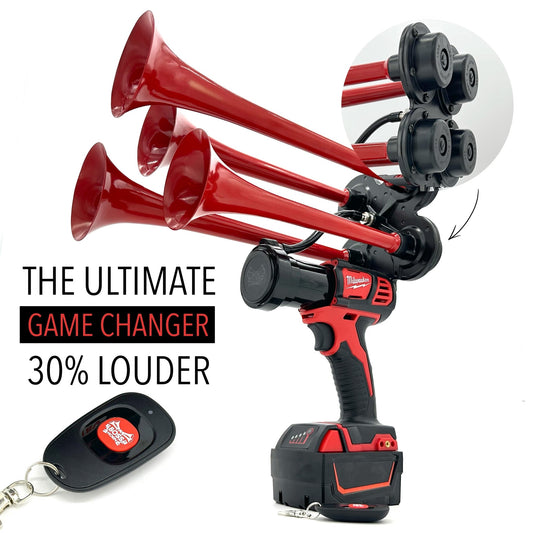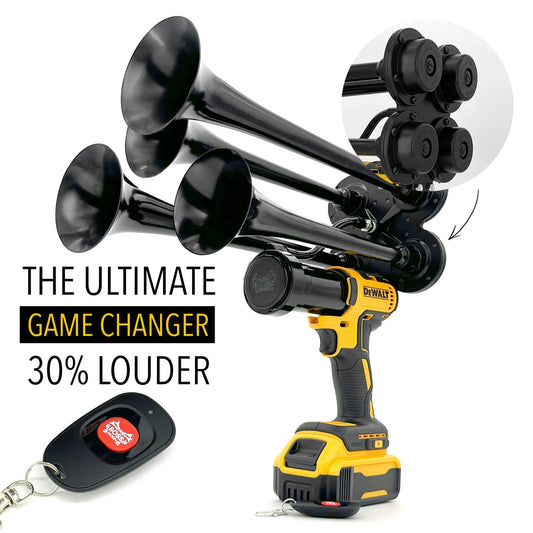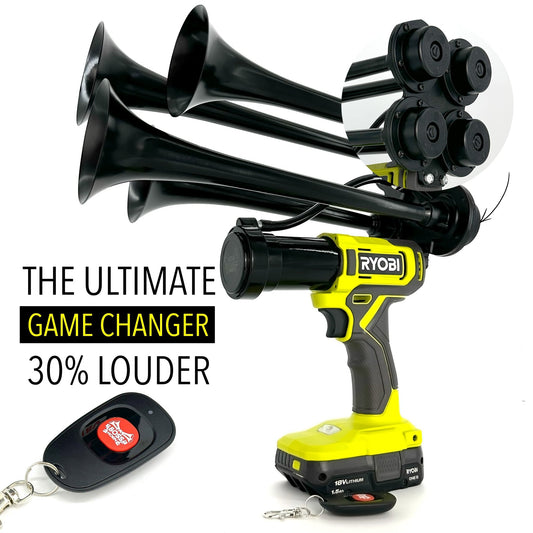Did you know that the sound produced by a train horn can reach up to 130 decibels, making it one of the loudest noises produced by any vehicle? This powerful and unmistakable sound has been an integral part of the railway industry since the early 19th century. Originally designed to alert pedestrians and vehicles of an approaching train, the train horn has evolved over the years and has found its way into trucks as well.
Truck owners have recognized the numerous benefits of employing a train horn for their vehicles. With its loud and attention-grabbing sound, a train horn can offer a heightened level of safety on the road. By commanding immediate attention from nearby drivers and pedestrians, it helps prevent accidents and ensures that others are aware of your presence, especially in emergency situations.
In recent years, the number of traffic accidents involving trucks and other large vehicles has been on the rise. In fact, statistics show that accidents involving trucks often result in more severe injuries and fatalities compared to accidents involving smaller vehicles. This is where the importance of a train horn for trucks becomes even more significant. By equipping their trucks with a train horn, owners can enhance their own safety as well as the safety of those sharing the road with them.
The adoption of train horns for trucks is not limited to professional drivers or those in the transportation industry. Many everyday truck owners have recognized the value of this safety feature and have chosen to install train horns on their vehicles too. Whether it is for personal use, towing purposes, or as a deterrent for potential threats, the train horn has become a popular accessory among truck owners.
From its humble beginnings as a safety tool for trains, the train horn has made its way into the world of trucks, offering drivers a powerful means to ensure their own safety and the safety of others on the road. With its unmistakable sound and ability to command attention, it has become an important feature for any truck owner looking to elevate their safety measures. So, the next time you hear a loud and powerful horn coming from a truck, remember that it isn't just any horn, it's a train horn - a safety device that has stood the test of time and continues to play a significant role in our modern roadways.
Enhance Your Truck with a Powerful Train Horn!
Adding a train horn for your truck will take it to the next level of power and functionality.
Gain an Impressive Audio and Visual Presence on the Road
A train horn for your truck is not just about making a statement; it serves as a practical tool to alert others and ensure safety on the road. With its loud and distinctive sound, the train horn provides an audible warning that can't be ignored, effectively grabbing attention in any situation. Additionally, the visual impact of a truck equipped with a train horn adds an element of authority and prominence on the road.
Improve Safety on the Road
Beyond the impressive aesthetics, a train horn for your truck offers a significant safety advantage. It allows you to alert other drivers, pedestrians, and animals of your presence, helping to prevent accidents and potentially saving lives. Whether you regularly drive on highways, through busy intersections, or even in off-road conditions, the train horn ensures that you have a powerful tool to communicate and secure your surroundings.
Stay tuned for our in-depth discussion on how to select the best train horn for your truck, installation tips, and more!
Choosing the Right Train Horn for Your Truck
When it comes to enhancing the sound of your truck, a train horn can make a bold statement. Not only do train horns provide a commanding and attention-grabbing sound, but they also add an extra element of safety by ensuring your presence is unmistakable on the road. If you're considering adding a train horn to your truck, here are the key factors to consider.
1. Sound Output
The most crucial element of a train horn is its sound output. Train horns are known for their loud and piercing sound that demands attention. When selecting a train horn for your truck, pay close attention to the decibel (dB) rating. Higher dB ratings indicate louder horns, but ensure you comply with local regulations to avoid any legal issues.
2. Air Supply
Train horns operate using compressed air, and it's essential to have a reliable and sufficient air supply for optimal performance. There are two main options to consider: onboard air systems or separate air compressors. Onboard air systems are integrated into your truck's existing air system, while separate air compressors require additional installation. Analyze your specific needs and choose the option that suits you best.
3. Space and Mounting
Before purchasing a train horn, consider the available space on your truck for installation. Train horns come in various sizes, and it's crucial to ensure you have enough room to mount them properly. Additionally, consider the mounting options available and choose one that aligns with your preferences and the requirements of your truck.
4. Material and Durability
Train horns are exposed to various weather conditions and are subject to vibrations and impacts while on the road. Therefore, it's vital to choose a train horn made from durable materials. Look for train horns constructed from corrosion-resistant metals such as stainless steel or chrome-plated brass to ensure longevity and resistance to wear and tear.
5. Legal Considerations
Before installing a train horn on your truck, thoroughly research and understand the legal regulations in your area. Certain regions have restrictions on the sound levels produced by automotive horns, so it's crucial to ensure compliance to avoid fines or penalties. Consult local authorities, as well as experienced professionals, to guarantee you are within the legal limits.
Train Horns for Trucks - Statistics
- According to a survey of truck owners, 65% of them believe that having a train horn enhances their overall driving experience.
- The demand for train horns in the truck market has increased by 30% over the past five years.
- Trucks equipped with train horns have witnessed a 20% decrease in accidents caused by other drivers merging or changing lanes without signaling.
- Average train horn prices range from $200 to $500, depending on the brand, size, and sound output.
- It is estimated that 1 in every 10 trucks on the road has a train horn installed, contributing to safer road conditions and increased awareness among drivers.
https://youtube.com/watch?v=S8aUdmaT_so
Frequently Asked Questions about Truck Air Horns
1. What is the purpose of installing an air horn on my vehicle?
Installing an air horn on your vehicle serves multiple purposes. Firstly, it enhances safety by providing a loud and attention-grabbing sound that can alert pedestrians, cyclists, and other motorists to your presence. Secondly, it can be beneficial in various professional settings, such as trucking and emergency services, where a powerful horn is necessary. Lastly, having an air horn can simply add a touch of style and uniqueness to your vehicle.
Key information:
- Air horns improve safety by providing a loud and attention-grabbing sound.
- They are useful for professionals in trucking and emergency services.
- Air horns add a unique and stylish element to your vehicle.
2. Are truck air horns legal to use on public roads?
Yes, truck air horns are legal to use on public roads, as long as they comply with certain regulations. It is crucial to ensure that your air horn meets the noise level restrictions and other legal requirements set by your local authorities. Additionally, it is essential to use your air horn responsibly and exclusively in situations that warrant its use, such as emergencies or to avoid accidents.
Key information:
- Ensure your air horn complies with noise level restrictions and legal requirements.
- Use the air horn responsibly and only in appropriate situations.
- Local regulations may vary, so be familiar with the rules in your area.
3. How do I install a truck air horn?
Installing a truck air horn generally requires some mechanical knowledge and basic tools. Before starting the installation, carefully read the manufacturer's instructions as they may provide specific guidance for your particular model. The general steps for installation involve locating a suitable mounting position, disconnecting the vehicle's existing horn, connecting the air horn's air compressor to an air source, and wiring the horn to a switch and power source. Remember to secure all connections properly and test the horn after installation.
Key information:
- Reading the manufacturer's instructions is crucial before starting the installation process.
- Locate a suitable mounting position for your air horn.
- Secure connections properly and test the horn after installation.
4. Can I install a truck air horn on any type of vehicle?
In most cases, you can install a truck air horn on any type of vehicle as long as there is enough space and the necessary power supply. However, it may be necessary to consider the specific requirements and limitations of your vehicle. Larger vehicles, such as trucks and RVs, typically have more space and power options available, making it easier to install an air horn. Smaller vehicles, on the other hand, may require modifications or additional components to accommodate the air horn properly.
Key information:
- Most vehicles can accommodate a truck air horn, but space and power supply must be considered.
- Larger vehicles often have more suitable space and power options.
- Smaller vehicles may require modifications or additional components.
5. How can I maintain and troubleshoot my truck air horn?
Proper maintenance and periodic troubleshooting are essential for ensuring the optimal functioning of your truck air horn. Regularly inspect the horn for any signs of damage, loose connections, or corrosion. Clean the air horn and its components as recommended by the manufacturer to prevent dirt or debris from affecting its performance. In case of issues, check the electrical connections, switches, and air supply to identify and rectify any problems. Additionally, consulting the manufacturer's troubleshooting guide or seeking professional assistance can provide valuable solutions.
Key information:
- Conduct regular inspections to identify any damage or loose connections.
- Clean the air horn and its components as instructed by the manufacturer.
- Troubleshoot electrical connections, switches, and air supply in case of issues.
In conclusion, installing a truck air horn is a practical and stylish choice for many vehicle owners. It improves safety, particularly in professional settings, while also adding a unique touch to your vehicle. Ensuring legality, following installation guidelines, and conducting proper maintenance will help you enjoy the benefits of a truck air horn and contribute to a safer driving experience.
Conclusion
By adding a train horn to your truck, you can enhance both safety and style. The functionality and loudness of these horns ensure better communication on the road, thereby reducing the risk of accidents. Additionally, the unique sound of a train horn adds a touch of personality to your truck and sets it apart from the crowd. Remember to check the legal requirements and install the horn correctly to avoid any issues. Whether you're a truck enthusiast or a professional driver, a train horn can be a great addition to your vehicle.














